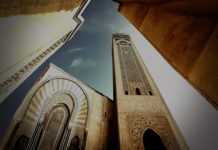Aspects of Emulating the Prophet’s Example
Continued from the previous article…
A person who contemplates the Prophet’s life finds that it includes every aspect of etiquette and good manners that are considered decent by all righteous and noble people.
The Prophet of Allah ﷺ was an Example in Good Manners:
Allah the Exalted Says (what means),
| “And indeed, you are of a great moral character.” [Quran: 68:4] |
The Prophet’s manners were based on the Qur’an. He ﷺ was pleased by whatever the Qur’an stated was good, and he was angered by whatever the Quran stated was evil and He ﷺ was neither harsh nor loud. He ﷺ used to forgive and not reply to a transgression with a similar transgression.
Safiyyah (the wife of the Prophet of Allah ﷺ said,
| “I have seen nobody with better manners than the Messenger of Allah ﷺ.” |
Anas (a companion) said,
| “I served Prophet Mohammad ﷺ for nine years. (During these nine years) he never asked as to why I did this or did not do that.” |
Anas also said,
| “Prophet Mohammad ﷺ had the best behavior and the best manners of all. One day he sent me somewhere on some business, but I said to myself, “I won’t go now” although I did [eventually] intend to go to where he commanded me. I came to the market (on my way) and passed by some children playing. Suddenly, the Prophet of Allah ﷺ appeared from behind me and held me by the neck. I looked behind and he was smiling. He ﷺ said: “O Anas, did you go where I told you to go”. I said, “I will go [now], O Prophet of Allah.” |
He ﷺ was also an example in tolerance:
Allah Says (what means),
| “So by mercy from Allah, [O Muhammad], you were lenient with them. And if you had been rude [in speech] and harsh in heart, they would have disbanded from about you.” [Quran: 3:159] |
Anas said,
| “I was walking with the Prophet of Allah ﷺ and he was wearing a Najraani robe that had rough sides. A Bedouin came upon him and pulled him by his robe very roughly, so I looked at the side of the Prophet’s neck, and the side of the robe had left a mark from the strong pull. He then said, ‘O Muhammad, give me some of Allah’s money that you have.’ So the Prophet of Allah ﷺ looked at him, laughed and ordered that he be given some.” |
He ﷺ was an example in kindness and mercy:
Allah The Exalted Says (what means),
| “And We have not sent you, [O Muhammad], except as a mercy to the worlds.” [Quran: 21:107] |
Abu Tharr (a companion) said,
| “One night the Messenger of Allah ﷺ prayed and continued to recite the verse (which means): If You should punish them – indeed they are Your servants; but if You forgive them, indeed it is You who is the Exalted in Might, the Wise. until morning. I asked him about this, He ﷺ responded: “I asked my Lord to permit me to intercede for my nation. He, The Exalted, granted me my wish. By Allah’s will I will intercede for whoever takes no partners with Allah.”” |
Maalik bin Al-Huwayrith (a companion) reported,
| “We came to the Messenger of Allah ﷺ and we were all young men of nearly equal ages. We stayed with him for twenty nights, and the Messenger of Allah ﷺ was extremely kind and tender-hearted” |
He ﷺ was a good example in maintaining an appreciation for past relationships:
‘Aa’ishah (the wife of the Prophet) said,
| “I did not feel jealous of any of the wives of the Prophet as much as I did of Khadeejah though I did not see her, but the Prophet used to mention her very often, and whenever he slaughtered a sheep, he would cut its parts and send them to the women friends of Khadeejah. When I sometimes said to him, ‘As if there is no woman on earth except Khadeejah!’ he would say, “Khadeejah was such-and-such [i.e. saying words of praise about her], and from her I had children.”” |
He ﷺ was an example in humbleness:
Allah The Almighty ordered His Prophet ﷺ Saying (what means),
| And lower your wing to those who follow you of the believers.” [Quran: 26:215] |
Meaning: be kind to them. Allah The Exalted ordered the Prophet of Allah ﷺ to be humble, gentle and kind to poor and rich believers. He ﷺ was so humble that he used to greet children when passing by them. As humble as he was, a young girl servant would take him by the hand and go wherever she pleased (to ask her questions).
He ﷺ would mend his sandals with his own hands, patch his clothes, milk his lamb, sit (socialize) with poor people and he used to walk with the orphans, widows and accept the invitation of whoever invited him.
He ﷺ would visit the ill, attend funerals and accept the invitation of a servant.
He ﷺ was an example in bravery:
‘Ali ibn Abu Taalib (a companion and the fourth Caliph) said,
| “During the Battle of Badr, we used to seek refuge with the Prophet of Allah ﷺ. He was the toughest among us, and He ﷺ used to bravely approach the rows of the enemy and would be the closest among us to them.” |
Al-Baraa’ ibn ‘Aazib (a companion) said,
| “By Allah! When things became difficult during battle we used to seek refuge with him. The bravest among us were those who used to keep up with him (meaning the Prophet of Allah ﷺ).” |
Anas also said,
| “Allah’s Messenger ﷺ was the best of people, the most generous amongst them and he was the bravest of men. One night the people of Madeenah felt disturbed and set forth in the direction of a sound when Allah’s Messenger ﷺ met them on his way back as he had gone towards that sound ahead of them. He was on the horse of Abu Talhah which had no saddle over it, and a sword was slung round his neck, and He ﷺ was saying, “There is nothing to be afraid of”, and He ﷺ also said, “We found it [this horse] like a torrent of water”, whereas the horse had been slow before that time.” |
He ﷺ was an example in generosity:
Ibn ‘Abbaas (a companion) said,
| “The Messenger of Allah ﷺ was the most generous of people. And he was most generous during Ramadhaan when Gabriel would meet him every night to study the Qu- ran with him. The Messenger of Allah ﷺ was more generous than a sent wind.” |
Jaabir ibn ‘Abdullaah (a companion) said,
| “The Messenger of Allah ﷺ was never asked for something and said, No.” |
Anas ibn Maalik said,
| “A man asked of the Prophet of Allah ﷺ so he gave him a flock of sheep filling a valley between two mountains. The man returned to his people, saying, ‘O people, embrace Islam. By Allah, Muhammad gives like one who fears no poverty.’” |
He ﷺ was an example in being ascetic and abandoning worldly gains:
One day ‘Umar ibn Al-Khattaab came into the house of the Prophet of Allah ﷺ to find him lying on a simple mat which had left its marks on his body. ‘Umar started to sob. “Why are you crying? O ‘Umar”, asked the Prophet of Allah ﷺ ‘Umar said, ‘I thought of Caesar and Chosroes sitting on thrones of gold, wearing silk. And you are the Messenger of Allah, yet here you are sitting on this simple mat- tress.’ Thereupon the Prophet of Allah ﷺ said, “O ‘Umar, are you not satisfied that they have this world and we have the next?”
The Prophet of Allah ﷺ encouraged his companions to be ascetic, and to be more attached to the Hereafter. He ﷺ performed Hajj while sitting on a worn-out saddle cloth and wearing a garment that was not worth four Dirhams (silver coins).
He ﷺ was an example in being steadfast and certain of Allah’s Promise
Somebody asked Al-Baraa’ ibn ‘Aazib (a companion),
| “Did you flee de- serting the Messenger of Allah ﷺ during the Battle of Hunayn?” Al-Baraa’ replied, “But the Messenger of Allah did not flee. The people of the Tribe of Hawaazin were good archers. When we met them, we at- tacked them, and they fled.” I saw the Messenger of Allah ﷺ on his white mule and Abu Sufyaan ibn Al-Haarith was holding its reins and the Prophet of Allah ﷺ was saying, “I am the Prophet in truth: I am the son of ‘Abd Al-Muttalib.”” |
He ﷺ was an example in being patient with people and forgiving wrongdoers
He ﷺ was described as,
| “Neither stiff nor harsh. He ﷺ did not raise his voice in markets. He did not retaliate mischief, but pardoned and forgave.” |
He was an Example in repentance and seeking forgiveness:/h3>
Abu Hurayrah (a companion) heard the Prophet of Allah ﷺ say,
| By Allah! I ask Allah for forgiveness and I repent each day more than seventy times. |
He ﷺ was an example in performing acts of worship:
‘Aa’ishah said,
| “The Prophet of Allah ﷺ used to stand in prayer at night until both his feet (or legs) swelled.” |
‘Ubayd ibn ‘Umayr (a Follower belonging to the generation succeeding the companions) asked ‘Aa’ishah, “Please tell us of the most amazing thing you ever saw about the Messenger of Allah ﷺ.” She paused, then said, One night He ﷺ told me, “Will you let me worship my Lord tonight?” I said, “By Allah, I love you to be next to me, and I love that you pray to your Lord.” She said, “He ﷺ stood and made ablution without using much water and then stood and prayed and continued crying until his beard was wet from his tears, and then prostrated and continued crying until the earth was wet from his tears. And then He ﷺ turned and lay down and continued crying until Bilaal came to call for the dawn prayer.” When he saw him crying he asked about the reason he cried so hard, to which He ﷺ replied, “O Bilaal, and why shouldn’t I cry and it has been revealed tonight (the verse which means), Indeed, in the creation of the heavens and the earth and the alteration of the night and the day are signs for those of understanding.” [Quran: 3:190]
He ﷺ was an example in how much he used to remember Allah (perform Thikr):
He ﷺ was the most perfect human being in performing Thikr. He would remember Allah in every condition: standing, sitting, walking, and riding, while travelling and while in residence.
He ﷺ called us to follow his example in performing prayer, fasting and marriage:
Anas said,
| “Three people went around the houses of the wives of the Prophet of Allah ﷺ to ask about how the Prophet of Allah ﷺ worshipped. When they were told, it was as if they thought their worship was little [in comparison] and said, ‘Where are we in relation to the Messenger of Allah ﷺ who has been forgiven his past and future wrong actions?’ One of them said, ‘I will pray all night every night.’ Another said, ‘I will fast all the time and not break the fast.’ The other said, ‘I will withdraw from women and never marry.’ The Messenger of Allah ﷺ came to them and said, “Are you the ones who said such-and-such? By Allah, I am the one among you with the most fear and awareness of Allah, but I fast and break the fast, I pray and I sleep, and I marry women. Whoever disdains my way is not from me [i.e., I am free from him].”” |
Ibn Hajar (a scholar) said,
| “The way of the Prophet was the simple way. He would eat in order to gain strength for fasting. He would sleep in order to gain strength to pray at night. And he would marry to break his lust, gain chastity, and increase his offspring. This Prophetic narration directs us toward following the example of people of high status.” |
He ﷺ was an example regarding rituals of Hajj (pilgrimage):
The necessity of adhering to the Prophet’s way could not be more evident than in Hajj. He ﷺ ordered us to follow his example in performing Hajj saying,
| Take your Hajj rituals from me. Perhaps I will not perform Hajj again. |
Following the Prophet’s example must not be limited to imitating aspects of his personality. It must include aspects of his practical life.
He ﷺ was the most perfect of people:
With regard to eating and drinking: He ﷺ never rejected any type of food that was present, and never asked for any particular kinds of food that were not available.
He ﷺ never rejected good food, and he never looked for faults in the food presented to him. If he liked the food he ate from it, otherwise He ﷺ would leave it. Months would pass and fire would not be seen lit in his house (i.e. no food was cooked). He ﷺ ate very little, and if food was not available, he would have patience. In fact, he used to tie a rock to his stomach to assuage hunger pangs.
He ﷺ said, “Bismillaah” before he began eating (which means, in the name of Allah), and would say afterwards, “O Allah! You have given us food, and drink. You have sufficed and provided. You have guided and gave life. So may praise be unto You for what you have given.”
Whenever he ate at someone’s house, He ﷺ would pray for them before departing. He ﷺ was not too proud to eat with those who were younger, older, free, slaves, Bedouins or residents of Madeenah.
As for sleeping and waking up: He ﷺ slept on his right side, while mentioning Allah and without being full of food or drink.
He ﷺ would place his hand under his head and say,
| O Allah! Protect me from Your torment on the day You resurrect Your servants. |
He ﷺ woke up upon hearing the caller for prayer. He ﷺ would praise Allah, glorify Him, and supplicate to Him. Then He ﷺ used to brush his teeth with a Siwaak (tooth stick used to clean the teeth), perform ablution and pray.
He ﷺ constantly communicated with his Lord, praising Him and demonstrating fear and hope.
Sometimes He ﷺ would sleep on a mattress, and sometimes on the floor, on mats made from straw or on his bed.
His speech, laughter and rears: He ﷺ did not speak very much. He used to speak slowly and clearly, not too fast for his speech to be memorized, and not too slow that there would be periods of silence. His guidance was the most perfect of guidance.
Often, He ﷺ repeated his words three times so people would understand it and when he greeted others he would do so three times. He ﷺ would be silent for long periods of time, speaking of nothing unnecessarily. He ﷺ used to say a lot in a few words.
He ﷺ did not speak on matters that did not pertain to him. He ﷺ only spoke of things that generated reward and whenever he disliked something his facial expression would show it.
Most of his laughter was in the form of smiling. The most that would appear from his smile were his front molars. He ﷺ would laugh at things that were funny or things that were considered amazing.
As for his crying: It was similar to his laughter. He ﷺ did not breathe hard while crying. His eyes would tear up and there would be some sounds in his chest.
Sometimes He ﷺ would cry because someone had died, sometimes out of fear for his nation, sometimes out of fear from Allah, and sometimes when listening to the Quran. He ﷺ cried out of love as well as out of glorification to Allah.
When his son Ibraaheem died, the Prophet of Allah ﷺ cried out of mercy. And He ﷺ cried when seeing one of his daughters on her deathbed.
And He ﷺ cried while listening to ‘Abdullaah ibn Mas’ood (a companion) reciting Chapter An-Nisaa’ of the Qu’ran.
He ﷺ also cried when ‘Uthmaan ibn Math’oon (a companion) passed away, and while praying the “eclipse prayer”.
He ﷺ cried while sitting near the grave of one of his daughters and he used to cry while praying the night prayer.
His speeches: When He ﷺ gave his sermons, his eyes would become red, his voice would become loud, and he would become angry as if he were warning an army. He ﷺ started all of his sermons with praising Allah.
The topics of his sermons revolved around praising Allah and glorifying His attributes. He ﷺ discussed the teachings of Islam, mentioning Heaven and Hell, and things that bring about Allah’s pleasure and wrath.
Ibn Al-Qayyim said,
| “He ﷺ used to discuss matters relevant to the listeners. Sometimes he would lengthen his sermons, and other times He ﷺ would shorten them, according to the people’s needs.” |
As for his dealings with people: He ﷺ was the best in dealing with people. He ﷺ would buy, sell and enter into business partnerships. Once, when a previous partner in business came to visit him, he [the man] asked the Prophet of Allah ﷺ, “Did you recognize me?” The Prophet of Allah ﷺ responded,
| Weren’t you my partner? You were a good partner. Neither did you conceal nor did you use to argue excessively. |
He ﷺ also gave gifts and accepted them. He ﷺ borrowed money and property and purchased goods with deferred forms of payment.
Whenever He ﷺ borrowed money he would pay back more than he borrowed and when someone would pay him back a loan that he had borrowed from him, He ﷺ would pray for him saying,
| May Allah bless your family and wealth. The reward for giving someone a loan is praise and to pay him back. |
He ﷺ dedicated a piece of land (Waqf; endowment) that he owned as a source of charity for the poor.
The Prophet of Allah ﷺ interceded for others (in worldly affairs), and asked others to intercede for him. He ﷺ did not get angry when Bareerah (a freed slave) rejected his request for her to return to her husband. He ﷺ was indeed the best of examples.
He ﷺ would joke with others but he always spoke the truth.
He ﷺ sometimes would race others and even wrestle with them.
He ﷺ served his family members, carried materials for building the Masjid (mosque) and he used to host his guests, and sometimes would be a guest at the houses of others.
Ibn Al-Qayyim said,
| “He ﷺ visited ill people, attended funerals, answered invitations, and looked after the needs of widows and poor people. He ﷺ enjoyed poetry and rewarded poets in return.” |
Visiting the ill: He ﷺ visited friends who fell ill. He once visited a Jewish servant of his who was ill and visited his non-believing uncle. He ﷺ offered Islam to both of them; the servant embraced Islam, but his uncle did not.
Ibn Al-Qayyim said,
| “He ﷺ would draw close to the sick person, sit close to his head and ask about his condition. He ﷺ used to wipe with his right hand over him and used to pray, “O Allah, the Lord of people! Take away the harm and cure, You are the healer, there is no cure but Your cure, a cure that does not leave any illness.”” |
As for Sunan Al-Fitrah (actions related to the natural disposition of man)
He ﷺ would start with his right side while wearing his shoes, combing his hair, performing ablution and giving and taking. He used his right hand for eating, drinking and ablution, and his left hand was for answering the call of nature and removing harmful objects.
As for cutting his hair, he used to either shave it all off or let it all grow. He ﷺ did not shave parts of it and leave other parts unshaven.
The Prophet of Allah ﷺ used to like using the Siwaak (tooth stick used to clean the teeth) during all times; after waking up from sleep, during Wudhoo’ (ablution), before prayer and when entering his house.
He ﷺ applied perfume abundantly and never refused perfume when offered to him.
He ﷺ liked combing his hair. Sometimes he would comb his own hair, and sometimes He ﷺ would let (his wife) ‘Aa’ishah comb his hair for him.
(NOTE: If you want to build a strong and powerful relationship with Allah, check out Islamia TV, where you can watch Islamic speakers from across the globe deliver inspiring and motivational courses. Learn more at www.islamia.tv.)






























![6817 How He Treated Them [4-4]](https://islaam.net/wp-content/uploads/2019/07/6817-How-He-Treated-Them-4-4.jpg)

















السلام عليكم.رجاء ارفعوا المصحف المرتل برواية ورش عن نافع للشيخ محمود خليل الحصري بجودة عالية؛ فإن جميع النسخ الموجودة على النت جودتها رديئة؛ والنسخة الأصلية شبه مفقودة.
والله المستعان
The Holy manners of Our Beloved Prophet ﷺ are key to enter Jannah…
For Holy Manners of our Prophet ﷺ about different issues and matters in life Quran Host (Learn Quran Online) is an Online Islamic Academy providing different courses to seek the knowledge in this regard.
Quran Host offered the following courses:
• Reading Quran with Tajweed
• Memorization of the Holy Qur’an
• Understanding of the Holy Qur’an
• Islamic Teachings for Kids
• Arabic Language Online
• & much more about Islamic Principals.
For more details please visit https://www.quranhost.com